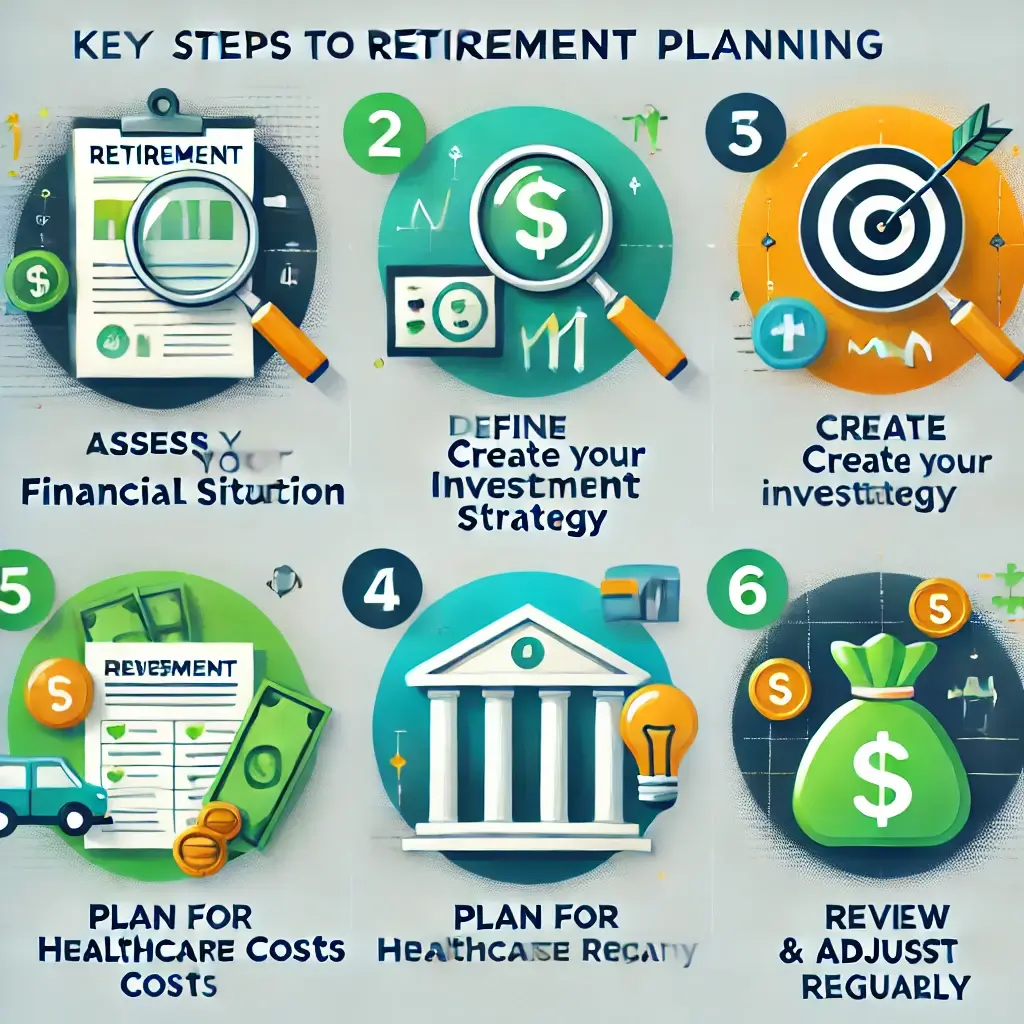Planning for retirement is one of the most critical financial milestones in life. A retirement financial planner specializes in guiding individuals through the complex process of saving, investing, and preparing for a secure and comfortable retirement. Unlike general financial advisors, retirement planners focus specifically on strategies that address post-retirement challenges, including income generation, healthcare costs, and legacy planning.
In this comprehensive guide, we’ll explore the role of a retirement financial planner, why you need one, and how to find the right planner for your retirement goals.
What Does a Retirement Financial Planner Do?
A retirement financial planner helps clients navigate the unique financial challenges of retirement. Their expertise lies in creating personalized plans to ensure you have enough income to sustain your lifestyle after you stop working.
Key services provided by retirement planners include:
- Retirement Income Planning:
- Assessing sources of retirement income such as Social Security, pensions, and savings.
- Creating a withdrawal strategy to prevent outliving your money.
- Investment Management:
- Balancing risk and growth in your investment portfolio as you approach retirement.
- Advising on annuities, bonds, and dividend-paying stocks for steady income.
- Tax Optimization:
- Minimizing taxes on retirement income through strategies like Roth IRA conversions or tax-efficient withdrawals.
- Healthcare and Long-Term Care Planning:
- Estimating healthcare costs and exploring options like Medicare, supplemental insurance, or long-term care insurance.
- Estate Planning:
- Ensuring your assets are distributed according to your wishes with minimal tax implications.
- Setting up trusts or wills for effective legacy planning.
Why You Need a Retirement Financial Planner
While it’s possible to plan for retirement on your own, working with a retirement financial planner provides several distinct advantages:
- Specialized Expertise: Retirement planners are well-versed in challenges like longevity risk, inflation, and healthcare expenses that affect retirees.
- Objective Perspective: They provide unbiased advice to help you avoid emotional decision-making, especially during market volatility.
- Time-Saving: Delegating complex financial tasks allows you to focus on enjoying your retirement.
- Customized Strategies: A planner tailors their advice to your unique financial situation, goals, and lifestyle.
- Risk Mitigation: They help safeguard your nest egg by balancing growth and income while minimizing risks.
Steps to Create a Retirement Plan
A retirement financial planner typically follows a structured process to create a retirement plan. Here are the key steps:
1. Assess Your Financial Situation
- Evaluate current savings, investments, income sources, and expenses.
- Identify gaps between your current resources and your retirement goals.
2. Define Your Retirement Goals
- Determine when you want to retire and the lifestyle you envision.
- Estimate future expenses, including housing, travel, and healthcare.
3. Develop an Investment Strategy
- Transition from growth-focused investments to income-generating assets as retirement nears.
- Diversify your portfolio to reduce risks while maintaining steady returns.
4. Plan for Healthcare Costs
- Estimate expenses for Medicare, supplemental insurance, and long-term care.
- Explore options to cover unforeseen medical emergencies.
5. Create a Withdrawal Plan
- Decide how much to withdraw annually to avoid depleting your savings.
- Use strategies like the 4% rule or dynamic spending adjustments.
6. Review and Adjust Regularly
- Periodically reassess your plan to account for changes in the market or personal circumstances.
Key Tools and Strategies Used by Retirement Financial Planners
A retirement financial planner leverages a variety of tools and strategies to maximize your retirement readiness:
- Retirement Calculators:
- Tools to estimate how much you need to save and how long your savings will last.
- Examples: Fidelity’s Retirement Score or Vanguard’s Retirement Planner.
- Monte Carlo Simulations:
- Analyzes the likelihood of meeting your financial goals under different scenarios.
- Social Security Optimization:
- Advises on the best time to claim Social Security to maximize benefits.
- Tax Diversification:
- Balancing pre-tax and post-tax accounts (e.g., 401(k), Roth IRA) for tax efficiency.
- Guaranteed Income Products:
- Using annuities to provide a steady income stream for life.

Choosing the Right Retirement Financial Planner
Selecting the right retirement financial planner is critical to achieving your goals. Here’s how to find one:
1. Look for Certifications
Choose planners with relevant credentials, such as:
- Certified Financial Planner (CFP): Comprehensive expertise in financial planning.
- Retirement Income Certified Professional (RICP): Specializes in retirement income planning.
2. Verify Their Experience
- Ask how long they’ve been working in retirement planning.
- Request examples of clients with similar retirement goals.
3. Understand Their Fee Structure
- Fee-Only Advisors: Charge flat fees or hourly rates, offering unbiased advice.
- Commission-Based Advisors: Earn commissions from selling products, which may create conflicts of interest.
4. Ask Key Questions
- What’s your process for creating a retirement plan?
- How do you manage risks in retirement portfolios?
- Are you a fiduciary, legally required to act in my best interest?
5. Read Reviews and Testimonials
- Check online reviews, ratings, and client testimonials to assess credibility.
Retirement Planner Near Me
Finding a retirement planner near me ensures that you have access to personalized and region-specific advice for your retirement goals. Local retirement planners are well-versed in the unique financial and tax laws of your area, which can play a crucial role in optimizing your retirement strategy. They also understand the local cost of living, housing market trends, and healthcare expenses, providing tailored recommendations to meet your needs. To locate a trusted retirement planner nearby, consider using directories like the Certified Financial Planner (CFP) Board or NAPFA, checking reviews on platforms like Google or Yelp, and asking for referrals from friends or family. A face-to-face consultation with a local planner allows for deeper trust and a better understanding of your financial priorities.
Common Mistakes to Avoid in Retirement Planning
Even with the help of a retirement financial planner, avoiding these common pitfalls is crucial:
- Underestimating Expenses:
- Failing to account for inflation or rising healthcare costs.
- Claiming Social Security Too Early:
- Taking benefits early reduces your monthly payout for life.
- Overlooking Tax Implications:
- Ignoring taxes on withdrawals can erode your retirement income.
- Neglecting Long-Term Care Planning:
- Failing to prepare for potential long-term care needs can drain your savings.
- Not Diversifying Investments:
- Relying too heavily on one type of asset increases risk.
Comparison: Retirement Financial Planner vs. General Financial Advisor
The following table gives the key difference between a retirement planer and a general financial advisor:
| Aspect | Retirement Financial Planner | General Financial Advisor |
|---|---|---|
| Specialization | Focused on retirement-specific strategies | Broad financial planning services |
| Target Audience | Pre-retirees and retirees | Individuals of all financial stages |
| Key Services | Income planning, Social Security, healthcare | Budgeting, debt management, investing |
| Typical Clients | Those nearing or in retirement | Clients with diverse financial goals |
Frequently Asked Questions
1. What is a retirement financial planner?
A retirement financial planner specializes in creating strategies to help clients achieve financial security in retirement.
2. How is a retirement financial planner different from a financial advisor?
While financial advisors offer general financial guidance, retirement planners focus specifically on the unique challenges and goals of retirement.
3. When should I hire a retirement financial planner?
Ideally, you should start working with a retirement planner 10-15 years before retirement to maximize your savings and preparation.
Conclusion
A retirement financial planner is an invaluable partner in navigating the complexities of preparing for your golden years. From crafting income strategies to mitigating risks and optimizing taxes, their expertise ensures your financial security throughout retirement. By choosing the right planner and avoiding common mistakes, you can enjoy a comfortable and stress-free retirement.
Call-to-Action (CTA):
Ready to secure your future? Start planning for your dream retirement by consulting a trusted retirement financial planner today.
